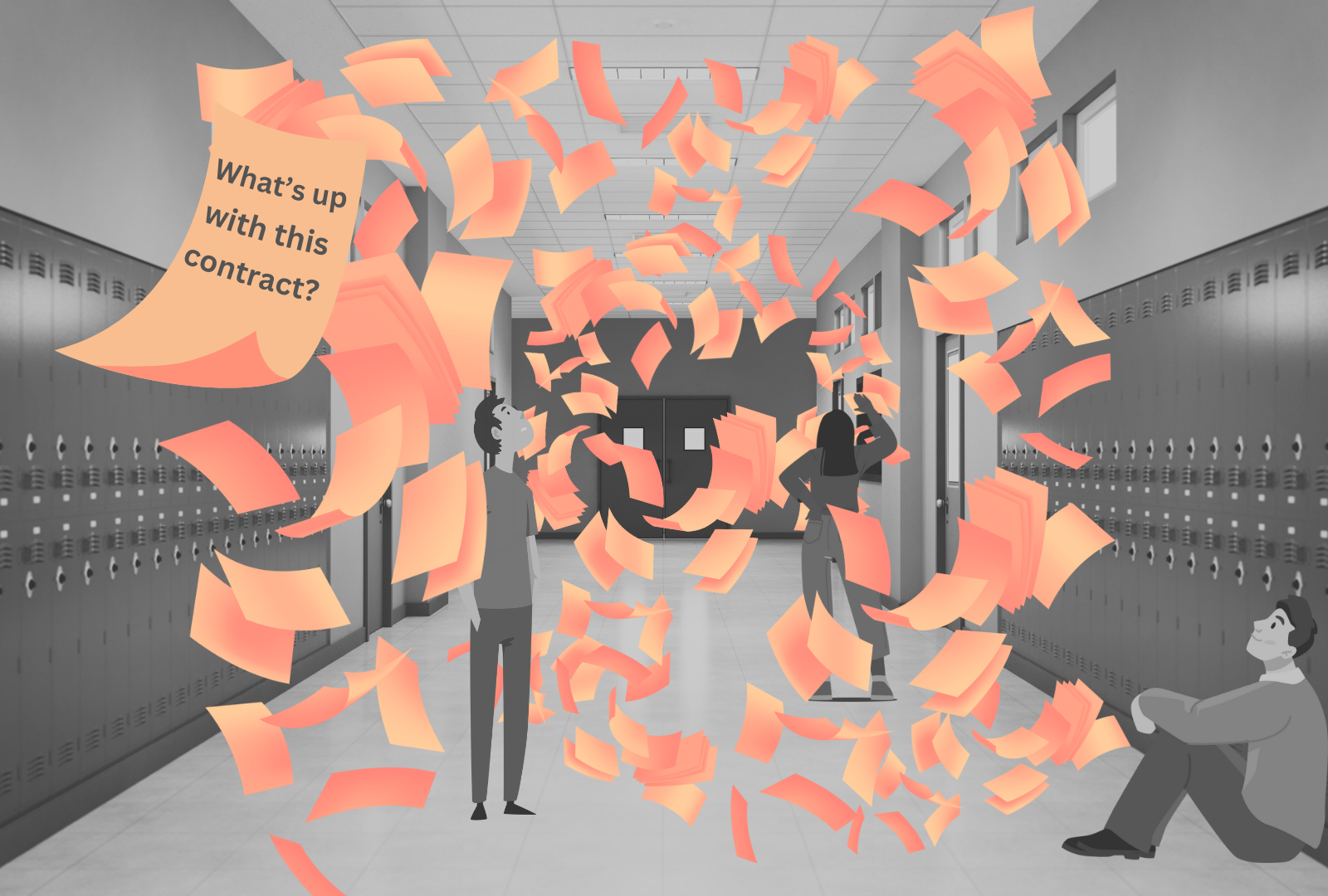As the end of September approached, bright orange pamphlets scattered the hallways of Newton South High School. In bold lettering, the pamphlets expressed concern and confusion about the school budget with questions like, “Why are we losing money for sports?” “Why are all the ceilings leaking?” and “What’s up with this contract?” Inside the brochures, the contract negotiations that began last fall were broken down with short explanations and a simple graphic. On the back, a checklist detailed ways that students could get involved. These pamphlets were one action taken by Students For Teachers (SFT), a group run by Leah Vashevko, Kevin Yang, Risha Sinha, and Roshan Karim in an effort to spread awareness about contract negotiations to students.
Recently, school funding has been a major issue in Newton. Contract negotiations for teachers came to a standstill at the beginning of the school year. Math teacher and Newton South representative on negotiations for the Newton Teachers Association (NTA) Ryan Normandin said that mainly, Newton teachers want cost of living adjustments.
“There are teachers who are working second jobs after school because they can’t afford food,” Normandin said. “So, we’re not super greedy, we’re not trying to get something crazy, we just want a fair contract.”
Cost of living adjustment means increasing social security benefits in response to inflation. Over the past five years, inflation has ranged from 0-9% settling currently at about 3.7%, but the school board is currently offering at most a 2% cost of living adjustment.
Much of the work teachers do is voluntary. Advising clubs often goes un-stipended and meeting with students and answering emails outside of the school day goes unrewarded. With a difference of up to 6% in what teachers are asking for and what the school board is offering, history teacher and building representative for the NTA Talia Gallagher says that teachers feel like they aren’t valued in Newton.
“Teachers are always taken advantage of for how much they care. The backbone of the education system is built on teachers’ unpaid efforts and labor and care,” Gallagher said.
Teachers have been encouraged by NTA president Michael Zilles not to work outside of school hours or do any extra work that they aren’t compensated for to protest the school committee.
Normandin said the goal of this is to get the attention of the school committee. “[Voluntary activities] are all things that we’re happy to do and really want to do, but we want to be paid for the work that we’re supposed to be paid to do before we start volunteering for other things too.”
In light of the negotiations, Newton South senior Leah Vashevko recognized the impact that many teachers had had on her and felt responsible for supporting them.
“Teachers have shaped the way I think and have pushed me to be a better version of myself,” Vashevko said. “I think in some ways it’s my responsibility to give back.”
Over the summer, both Vashevko and Newton South senior Kevin Yang felt that they wanted to get students involved with the contract negotiations in some way. When school started, Vashevko, Yang, Newton South junior Risha Sinha, and Newton North senior Roshan Karim met twice for seven hours each to brainstorm ideas and research and then met regularly after school to create the pamphlets that were distributed to both South and North, as well as to parents of students from each school. They partnered with Newton North’s Ted Porfiriev to distribute a total of 2000 pamphlets. The main goal of these pamphlets was to spread awareness about budget issues.
“Not a lot of people are aware of what’s actually happening,” Yang said. “We wanted to create a means to engage people with the topic as well as an easy way to digest the information.”
On top of their goal to make information accessible, Vashevko said the SFT wants to create a platform for students to share their opinions, something that’s often unavailable.
“There isn’t really a place in the system where students can make their voices heard,” said Vashevko. “So what we’re working on now is thinking about how we can make student voices heard and how we can share student perspectives.”
Vashevko, Yang, Sinha, and Karim shared their voices through the pamphlets and in other ways. Both Yang and Sinha spoke at a school committee conference late September and shared times when teachers had impacted them. The SFT also attended a march organized by the Newton Teacher Association from Newton North to the Education Center on October 23.
Gallagher thinks it’s great that students are using their voices to advocate for change: “It’s so nice that we are able to see that solidarity coming together, not just along teacher lines, but also student and teacher lines.”
Normandin noted that he’s happy to see students organizing. “I think it’s good practice for everything after high school,” said Normandin. “A lot of times people in power will take advantage of the people below them, so it’s nice to be willing to call that out even as a young person, and I think it sets you up really great to interact in a democratic society.”
Vashevko is confident that SFT isn’t the be-all and end-all of student activism: “We started this because we wanted to make a difference. If other students want to do something as well, go get a group of friends and go do it. Be the change you want to see.”




